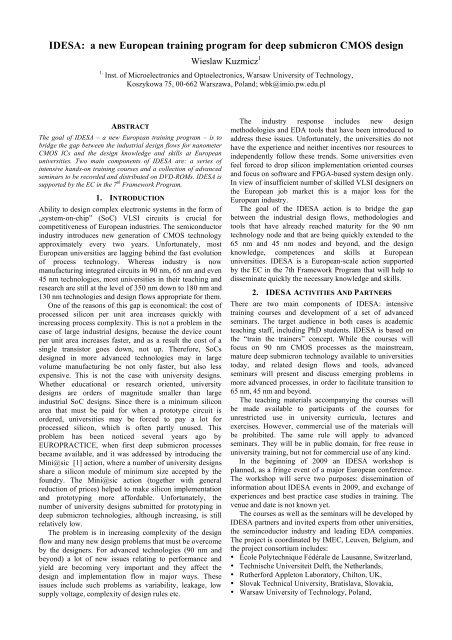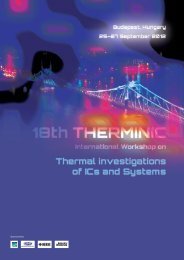a new European training program for deep submicron CMOS design
a new European training program for deep submicron CMOS design
a new European training program for deep submicron CMOS design
Create successful ePaper yourself
Turn your PDF publications into a flip-book with our unique Google optimized e-Paper software.
IDESA: a <strong>new</strong> <strong>European</strong> <strong>training</strong> <strong>program</strong> <strong>for</strong> <strong>deep</strong> <strong>submicron</strong> <strong>CMOS</strong> <strong>design</strong><br />
Wieslaw Kuzmicz 1<br />
1. Inst. of Microelectronics and Optoelectronics, Warsaw University of Technology,<br />
Koszykowa 75, 00-662 Warszawa, Poland; wbk@imio.pw.edu.pl<br />
ABSTRACT<br />
The goal of IDESA – a <strong>new</strong> <strong>European</strong> <strong>training</strong> <strong>program</strong> – is to<br />
bridge the gap between the industrial <strong>design</strong> flows <strong>for</strong> nanometer<br />
<strong>CMOS</strong> ICs and the <strong>design</strong> knowledge and skills at <strong>European</strong><br />
universities. Two main components of IDESA are: a series of<br />
intensive hands-on <strong>training</strong> courses and a collection of advanced<br />
seminars to be recorded and distributed on DVD-ROMs. IDESA is<br />
supported by the EC in the 7 th Framework Program.<br />
1. INTRODUCTION<br />
Ability to <strong>design</strong> complex electronic systems in the <strong>for</strong>m of<br />
„system-on-chip” (SoC) VLSI circuits is crucial <strong>for</strong><br />
competitiveness of <strong>European</strong> industries. The semiconductor<br />
industry introduces <strong>new</strong> generation of <strong>CMOS</strong> technology<br />
approximately every two years. Un<strong>for</strong>tunately, most<br />
<strong>European</strong> universities are lagging behind the fast evolution<br />
of process technology. Whereas industry is now<br />
manufacturing integrated circuits in 90 nm, 65 nm and even<br />
45 nm technologies, most universities in their teaching and<br />
research are still at the level of 350 nm down to 180 nm and<br />
130 nm technologies and <strong>design</strong> flows appropriate <strong>for</strong> them.<br />
One of the reasons of this gap is economical: the cost of<br />
processed silicon per unit area increases quickly with<br />
increasing process complexity. This is not a problem in the<br />
case of large industrial <strong>design</strong>s, because the device count<br />
per unit area increases faster, and as a result the cost of a<br />
single transistor goes down, not up. There<strong>for</strong>e, SoCs<br />
<strong>design</strong>ed in more advanced technologies may in large<br />
volume manufacturing be not only faster, but also less<br />
expensive. This is not the case with university <strong>design</strong>s.<br />
Whether educational or research oriented, university<br />
<strong>design</strong>s are orders of magnitude smaller than large<br />
industrial SoC <strong>design</strong>s. Since there is a minimum silicon<br />
area that must be paid <strong>for</strong> when a prototype circuit is<br />
ordered, universities may be <strong>for</strong>ced to pay a lot <strong>for</strong><br />
processed silicon, which is often partly unused. This<br />
problem has been noticed several years ago by<br />
EUROPRACTICE, when first <strong>deep</strong> <strong>submicron</strong> processes<br />
became available, and it was addressed by introducing the<br />
Mini@sic [1] action, where a number of university <strong>design</strong>s<br />
share a silicon module of minimum size accepted by the<br />
foundry. The Mini@sic action (together with general<br />
reduction of prices) helped to make silicon implementation<br />
and prototyping more af<strong>for</strong>dable. Un<strong>for</strong>tunately, the<br />
number of university <strong>design</strong>s submitted <strong>for</strong> prototyping in<br />
<strong>deep</strong> <strong>submicron</strong> technologies, although increasing, is still<br />
relatively low.<br />
The problem is in increasing complexity of the <strong>design</strong><br />
flow and many <strong>new</strong> <strong>design</strong> problems that must be overcome<br />
by the <strong>design</strong>ers. For advanced technologies (90 nm and<br />
beyond) a lot of <strong>new</strong> issues relating to per<strong>for</strong>mance and<br />
yield are becoming very important and they affect the<br />
<strong>design</strong> and implementation flow in major ways. These<br />
issues include such problems as variability, leakage, low<br />
supply voltage, complexity of <strong>design</strong> rules etc.<br />
The industry response includes <strong>new</strong> <strong>design</strong><br />
methodologies and EDA tools that have been introduced to<br />
address these issues. Un<strong>for</strong>tunately, the universities do not<br />
have the experience and neither incentives nor resources to<br />
independently follow these trends. Some universities even<br />
feel <strong>for</strong>ced to drop silicon implementation oriented courses<br />
and focus on software and FPGA-based system <strong>design</strong> only.<br />
In view of insufficient number of skilled VLSI <strong>design</strong>ers on<br />
the <strong>European</strong> job market this is a major loss <strong>for</strong> the<br />
<strong>European</strong> industry.<br />
The goal of the IDESA action is to bridge the gap<br />
between the industrial <strong>design</strong> flows, methodologies and<br />
tools that have already reached maturity <strong>for</strong> the 90 nm<br />
technology node and that are being quickly extended to the<br />
65 nm and 45 nm nodes and beyond, and the <strong>design</strong><br />
knowledge, competences and skills at <strong>European</strong><br />
universities. IDESA is a <strong>European</strong>-scale action supported<br />
by the EC in the 7th Framework Program that will help to<br />
disseminate quickly the necessary knowledge and skills.<br />
2. IDESA ACTIVITIES AND PARTNERS<br />
There are two main components of IDESA: intensive<br />
<strong>training</strong> courses and development of a set of advanced<br />
seminars. The target audience in both cases is academic<br />
teaching staff, including PhD students. IDESA is based on<br />
the “train the trainers” concept. While the courses will<br />
focus on 90 nm <strong>CMOS</strong> processes as the mainstream,<br />
mature <strong>deep</strong> <strong>submicron</strong> technology available to universities<br />
today, and related <strong>design</strong> flows and tools, advanced<br />
seminars will present and discuss emerging problems in<br />
more advanced processes, in order to facilitate transition to<br />
65 nm, 45 nm and beyond.<br />
The teaching materials accompanying the courses will<br />
be made available to participants of the courses <strong>for</strong><br />
unrestricted use in university curricula, lectures and<br />
exercises. However, commercial use of the materials will<br />
be prohibited. The same rule will apply to advanced<br />
seminars. They will be in public domain, <strong>for</strong> free reuse in<br />
university <strong>training</strong>, but not <strong>for</strong> commercial use of any kind.<br />
In the beginning of 2009 an IDESA workshop is<br />
planned, as a fringe event of a major <strong>European</strong> conference.<br />
The workshop will serve two purposes: dissemination of<br />
in<strong>for</strong>mation about IDESA events in 2009, and exchange of<br />
experiences and best practice case studies in <strong>training</strong>. The<br />
venue and date is not known yet.<br />
The courses as well as the seminars will be developed by<br />
IDESA partners and invited experts from other universities,<br />
the semincoductor industry and leading EDA companies.<br />
The project is coordinated by IMEC, Leuven, Belgium, and<br />
the project consortium includes:<br />
• École Polytechnique Fédérale de Lausanne, Switzerland,<br />
• Technische Universiteit Delft, the Netherlands,<br />
• Ruther<strong>for</strong>d Appleton Laboratory, Chilton, UK,<br />
• Slovak Technical University, Bratislava, Slovakia,<br />
• Warsaw University of Technology, Poland,
• Katholieke Universiteit Leuven, Belgium,<br />
• CEA LETI, Grenoble, France.<br />
3. INTENSIVE TRAINING COURSES<br />
IDESA will organize several 4- or 5-day courses on<br />
advanced IC implementation flow, targeting professors,<br />
post-docs and PhD students. All courses will include<br />
lectures and hands-on <strong>training</strong> sessions. Participation in the<br />
courses will be free of charge, except small fee (typically<br />
50 € per day) covering costs of <strong>training</strong> material, coffee<br />
breaks and other expenses of local organizers. The<br />
participants will be, however, responsible <strong>for</strong> their travel<br />
and lodging expenses. The idea is to make the courses<br />
af<strong>for</strong>dable <strong>for</strong> university staff in all <strong>European</strong> countries.<br />
There<strong>for</strong>e, the courses will be repeated in many regions of<br />
Europe in order to minimize travel costs.<br />
Four courses are planned:<br />
A. Advanced analog implementation flow<br />
This 5-day course will start with a short overview of the<br />
90 nm IC process flow, it will cover device modelling<br />
issues, hand calculation versus simulation accuracy,<br />
transistor level and behavioral level <strong>design</strong>, analog cell<br />
trimming using digital functions, mixed mode simulation,<br />
mismatch and yield modelling and analysis, and analog<br />
modelling and circuit optimisation.<br />
B. Advanced RF implementation flow<br />
This 5-day RF implementation flow course will start<br />
with a short overview of the RF 90 nm IC process flow, it<br />
will cover device modelling issues, microwave passive<br />
component <strong>design</strong> and simulation, testing and microwave<br />
measurements, mismatch modelling and simulation, mixedmode<br />
SoC <strong>design</strong> and simulation, analog and RF cell<br />
trimming using digital functions, 90 nm <strong>design</strong> verification,<br />
circuit packaging and ESD-protection.<br />
C. Advanced digital physical implementation flow<br />
This 5-day course will start by introducing the<br />
challenges <strong>for</strong> 90 nm SoC <strong>design</strong> and the <strong>design</strong><br />
environment. The course will proceed with digital<br />
synthesis, leakage-aware <strong>design</strong>, <strong>design</strong> planning and<br />
floorplanning, library analysis and management. It will<br />
focus upon low power <strong>design</strong> flow covering techniques to<br />
minimise dynamic and static power consumption, multiple<br />
clock tree synthesis, test and multimode and multicorner<br />
optimisation. IR-drop analysis, dynamic power analysis<br />
sign-off and <strong>design</strong> finishing and layout verification will be<br />
covered. Extensive hands-on labs are part of the course.<br />
D. Design <strong>for</strong> manufacturing flow<br />
This 4-day course will introduce the advanced IC<br />
manufacturing flow, and will focus upon defectivity, postlayout<br />
manufacturability issues such as optical proximity<br />
correction (OPC) and will include litho simulations and<br />
process window issues. After these process oriented topics,<br />
the course will address <strong>design</strong> and layout <strong>for</strong> litho<br />
manufacturability, with proper attention <strong>for</strong> the back-end<br />
dual damascene copper interconnect issues. Hands-on<br />
sessions on DFM solutions and yield analysis, <strong>design</strong>-<strong>for</strong>test<br />
and yield management will be included.<br />
4. ADVANCED SEMINARS<br />
The portfolio of seminars will include about 30 seminars,<br />
from 1 to 3 hours each, covering several major domains:<br />
• variability and reliability effects,<br />
• <strong>design</strong> countermeasures (related to variability, leakage<br />
etc.),<br />
• leakage, low power and low voltage issues,<br />
• advanced device issues.<br />
Some of the seminars will include exercise material to<br />
allow the students to achieve <strong>deep</strong>er understanding of the<br />
topic.<br />
An innovative aspect here is that these seminars will be<br />
recorded and distributed to interested universities using<br />
state-of-the-art multimedia technologies.<br />
5. PRACTICAL INFORMATION<br />
IDESA Web site [2] is the main source of in<strong>for</strong>mation<br />
about the project. It allows also to register <strong>for</strong> the courses.<br />
The first courses have already been announced. They will<br />
take place in May (course D in Leuven and course B in<br />
Delft), June (course A in Lausanne) and August (course C<br />
in Leuven). The Web site will also publish the list of<br />
recorded seminars when they become available <strong>for</strong><br />
distribution.<br />
6. CONCLUSIONS<br />
It is crucial <strong>for</strong> competitiveness of <strong>European</strong> industries to<br />
maintain competences in VLSI and SoC <strong>design</strong>, including<br />
<strong>design</strong> in the most advanced <strong>deep</strong> <strong>submicron</strong> technologies.<br />
The IDESA action will help to keep and expand VLSI and<br />
SoC <strong>design</strong> courses (including physical implementation) in<br />
the curricula of <strong>European</strong> universities and follow industrial<br />
trends.<br />
ACKNOWLEDGMENTS<br />
Collaboration of all project partners, and in particular Bart De<br />
Mey from IMEC, is gratefully acknowledged. IDESA is funded by<br />
the EC 7 th Framework Program, Grant Agreement No. 215180.<br />
REFERENCES<br />
[1] Mini@sic: in<strong>for</strong>mation available at http://www.europracticeic.com/prototyping_minisic.php<br />
[2] IDESA Web site: http://www.idesa-<strong>training</strong>.org/







